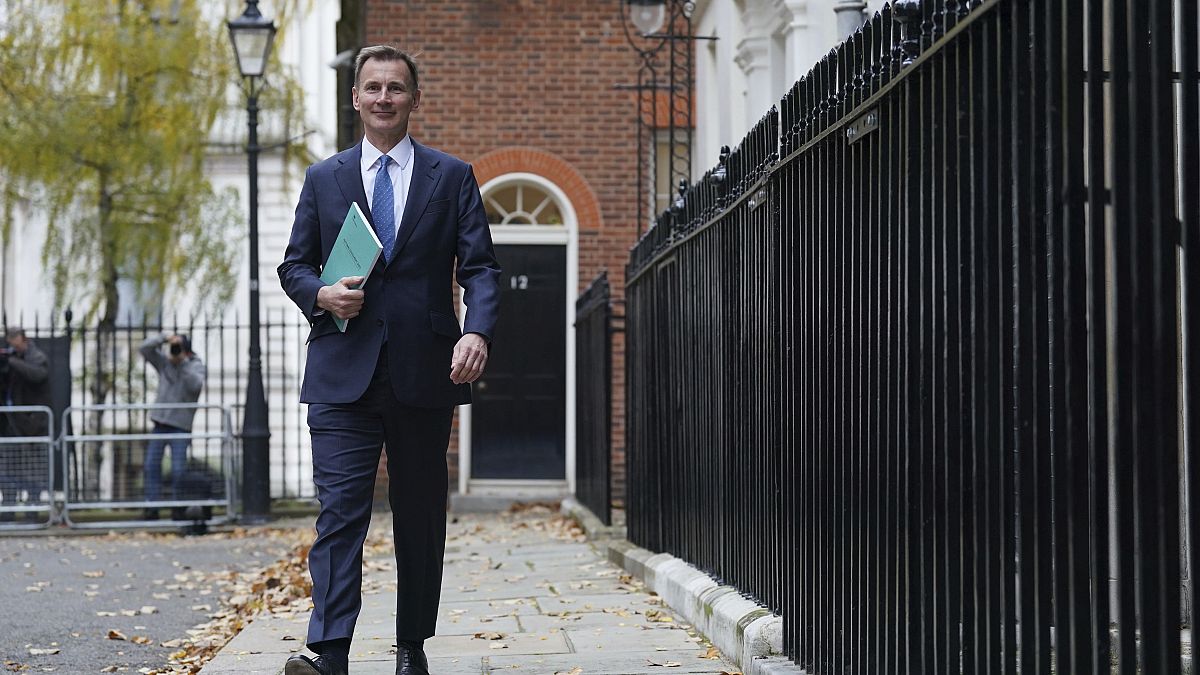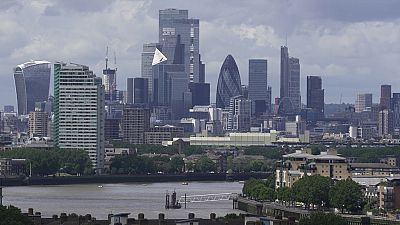UK Chancellor of the Exchequer Jeremy Hunt has outlined the government’s financial plans for the year ahead in a press conference. Here's the key takeaways.
In his Autumn Statement, Jeremy Hunt shared the UK government's economic plans for 2024 and said those who failed to engage with the process of looking for work will have their payments stopped after six months.
Hunt also announced changes to National Insurance payments, state pensions and business rates. Here's a breakdown of some of the key announcements.
Benefits
Hunt pledged that benefits will increase next year by 6.7%, which was the inflation rate level for September.
This amounts to an average increase of £470 (€540) for 5.5 million households next year.
He said that this applies to means-tested benefits such as Universal Credit and disability benefits.
In October, headline inflation came in at an annual 4.6% in October. It marked the lowest reading in two years. However, it remains well above the Bank of England's 2% inflation target.
Hunt also confirmed that the local housing allowance will be increased to give 1.6 million households an average of £800 of support next year.
State pensions
The chancellor also announced that the full new state pension will rise by 8.5% to £221.20 per week from April 2024, which is worth up to £900 per year for pensioners.
Hunt highlighted that, including today’s measures, it takes this government’s “total commitment to easing cost of living pressures” to £104 billion.
"That is one of the largest ever cash increases to the state pension - showing a Conservative government will always back our pensioners," he said.
The government will also honour its commitment to the pensions triple lock in full.
Under the triple lock policy, state pensions are supposed to increase each April in line with the highest of one of three things: either the inflation rate, average earnings, or 2.5%.
Artificial intelligence investment
The government will invest £500 million over the next two years to fund more "innovation centres" to help make the UK an "AI powerhouse".
This, Hunt said, follows "the success of the supercomputing centres in Edinburgh and Bristol".
Funds for manufacturing
The Chancellor of the Exchequer - the UK equivalent of finance minister - highlighted a £4.5 billion boost to manufacturing until 2030.
He emphasised a strategic investment in key sectors, such as aerospace, life sciences and the burgeoning green industry, with allocations of £975 million, £520 million, and £960 million, respectively.
Defence spending
The government will meet its NATO commitment to spend 2% of GDP on defence.
Hunt said this is "critical at a time of global threats to the international order most notably from Putin’s evil war in Ukraine".
Combating anti-semitism
Addressing the alarming anti-semitic rise in the UK, Hunt unveiled a dedicated initiative, allocating £7 million over the next three years to organisations like the Holocaust Education Trust.
The primary focus is on combating anti-semitism in educational institutions, such as schools and universities, asserting the imperative of preventing any regression in the fight against anti-semitism and all forms of racism, the Chancellor added.
Self-employment reforms
Detailing the National Insurance reforms outlined by Hunt, the proposal includes the elimination of the "Class 2" National Insurance charge for self-employed individuals earning more than £12,570, eradicating a mandatory flat-rate charge of £3.45 per week and resulting in an average annual saving of £192 for the self-employed.
Additionally, those paying "Class 4" National Insurance at 9% on earnings between £12,570 and £50,270 will experience a 1% reduction to 8% starting in April.
Hunt estimates that, in conjunction with the removal of the compulsory Class 2 charge, these comprehensive reforms will deliver an average annual savings of approximately £350 for around two million self-employed individuals.
Business rate changes
The chancellor underscores the government's commitment to supporting small businesses, highlighting the already implemented relief through the acquisition of a third of properties.
Hunt announces a further one-year freeze on the small business multiplier and an extension of the 75% discount on business rates, up to £110,000, for retail, hospitality, and leisure businesses.
With these measures in place for another year, Hunt anticipates significant savings, estimating that the average independent shop will save over £20,000, while the average independent pub stands to benefit by more than £12,800 in the upcoming year.
Tax rates for businesses
The Chancellor declared the permanent establishment of a significant business tax break known as "full expensing."
This measure allows businesses to claim back 25p in corporation tax for every £1 invested in IT, machinery, and equipment, offering a substantial advantage by permitting companies to do this in a single transaction rather than spreading the cost over an extended period.
Particularly beneficial for businesses heavily invested in equipment, such as manufacturers, this initiative is expected to cost £11 billion annually and is hailed by Hunt as the "largest business tax cut in modern British history."
With this move, the UK not only boasts the lowest headline corporation tax rate in the G7 but also the most generous capital allowances.



